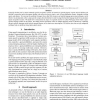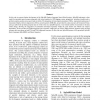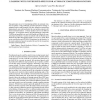34 search results - page 4 / 7 » Vocabulary and language model adaptation using just one spee... |
LREC
2008
13 years 10 months ago
2008
Language models used in current automatic speech recognition systems are trained on general-purpose corpora and are therefore not relevant to transcribe spoken documents dealing w...
ICASSP
2009
IEEE
13 years 6 months ago
2009
IEEE
The use of the PC and Internet for placing telephone calls will present new opportunities to capture vast amounts of un-transcribed speech for a particular speaker. This paper inv...
LREC
2010
13 years 10 months ago
2010
In this work we present further development of the SpLaSH (Spoken Language Search Hawk) project. SpLaSH implements a data model for annotated speech corpora integrated with textua...
TSD
2010
Springer
13 years 7 months ago
2010
Springer
The vocabulary used in speech usually consists of two types of words: a limited set of common words, shared across multiple documents, and a virtually unlimited set of rare words, ...
ICASSP
2010
IEEE
13 years 8 months ago
2010
IEEE
Data sparseness is an ever dominating problem in automatic emotion recognition. Using artificially generated speech for training or adapting models could potentially ease this: t...



